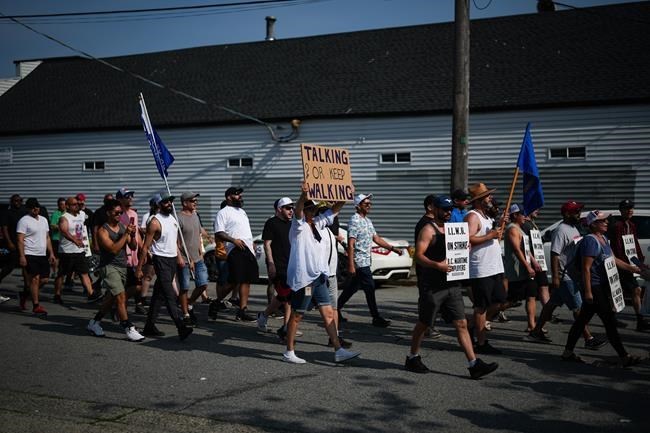A shipment of Franklin Forest Products Ltd.’s lumber from Port Alberni is sitting in Vancouver because job action is preventing cargo vessels from sailing to offshore ports.
That affects a company because it doesn’t get paid until the product is shipped, Mike McKay, Franklin Forest Products owner, said Friday.
The strike is taking place immediately after a wildfire closed Highway 4 east of Port Alberni. The highway has since reopened but the port strike is delivering the latest in a number ongoing transportation blows, including COVID, in the past few years.
“There will be all kinds of stuff backing up right now.”
Franklin exports lumber from its sawmill, where 35 people are employed, into the South Seas in Asia, McKay said.
The lumber now in Vancouver was recently shipped to the mainland, he said. “It’s just all going to get pushed back a week, two, three — who knows how long?”
The shipment went to Vancouver to be treated and then loaded into shipping containers.
The strike is affecting the Port of Nanaimo where a vehicle processing centre takes shipments of new vehicles going to markets in Canada.
The Grand Pioneer cargo ship carrying a shipment of vehicles was unable to discharge its cargo in recent days because of picketing at the port. It went off to Portland, Oregon, and is now going to Toyohashi, Japan.
Ian Marr, president of the Nanaimo Port Authority, said Friday that he does not know if the vessel went to Portland to offload vehicles or only to fuel up. “Hopefully it will be able to come back in the near future.”
Some industry officials worry the strike will harm B.C.’s reputation. Marr said, “All over the world you get these problems at some point in time so I think people realize that.” He is hoping for a swift resolution.
Prime Minister Justin Trudeau said the federal government will continue putting pressure on both sides to end the port strike, as the stoppage dragged on for a seventh day.
Trudeau, who is in Calgary, said he’s aware of how “impactful” the strike has been on Prairie businesses.
About 7,400 members of the International Longshore and Warehouse Union Canada walked off the job on Saturday at about 30 ports in B.C.
There’s been no sign of a break in the deadlock that emerged when talks broke down on Monday.
The B.C. Maritime Employers Association is urging the union to return to bargaining under “a voluntary mediation-arbitration process,” while the union accuses the employers of trying to get the government to do its “dirty work.”
Trudeau said the best deals are made at the bargaining table, and he knows that “a solution is out there.”
“But I also know that pressure is mounting day by day and people are really, really worried what things could look like next week, and we are as well,” Trudeau said.
Alberta Premier Danielle Smith said Friday that the port strike is causing “extreme hardship” for her province’s producers and exporters.
She said she had written to Trudeau asking him to recall Parliament to end the strike.
Alberta Transport Minister Devin Dreeshen had earlier called on the federal government to consider back-to-work legislation.
Opposition members of the B.C. legislature added their voices to business and political groups demanding action to end the strike.
A statement issued Friday by BC United members Greg Kyllo and Ben Stewart said New Democrat Premier David Eby must call on the federal government to intervene.
“While premiers from other provinces have voiced their concerns, Premier David Eby and NDP Labour Minister Harry Bains have remained silent as the strike’s effects continue to escalate,” Kyllo said in the statement.
The employers association, which represents 49 firms operating out of B.C. ports, issued a statement Thursday that said it had learned of layoffs in related industries due to the job action.
It said the strike had potentially disrupted $4.6 billion worth of cargo.
The B.C. Council of Forest Industries also called for federal intervention, or for dock workers and port employers to reach a quick resolution.
The organization’s chief economist, Kurt Niquidet, said some forest companies are mulling shipments by rail or truck to get their lumber to the United States, but that’s not an option for companies needing access to Asian markets.
Longshore workers voted overwhelmingly for strike action to seek improved wages and provisions against contracting out and automation.
There have been no talks since the two sides hit an impasse over maintenance issues.
Union president Rob Ashton told a solidarity rally on Thursday that the employers association has walked away from the table three times.
He told the crowd gathered near the Port of Vancouver that the employers are waiting for the federal government to do their “dirty work instead of treating workers with respect” by negotiating.
Federal Labour Minister Seamus O’Regan has urged the two sides to use mediators and resume talks.



